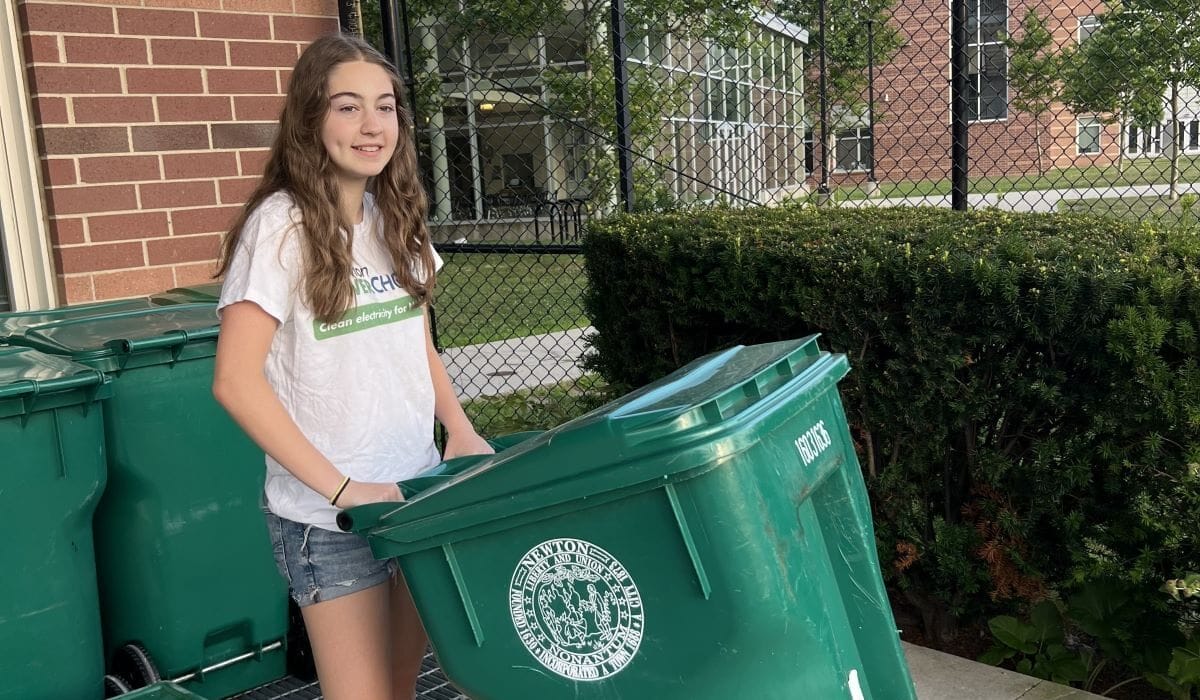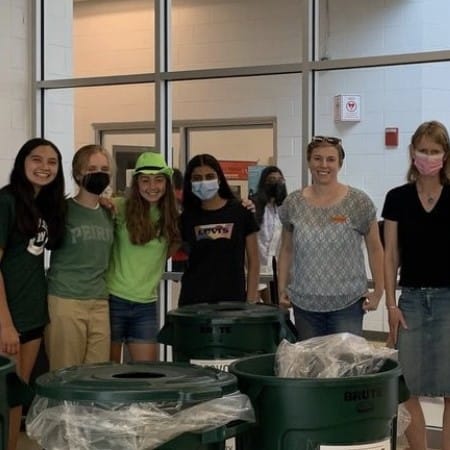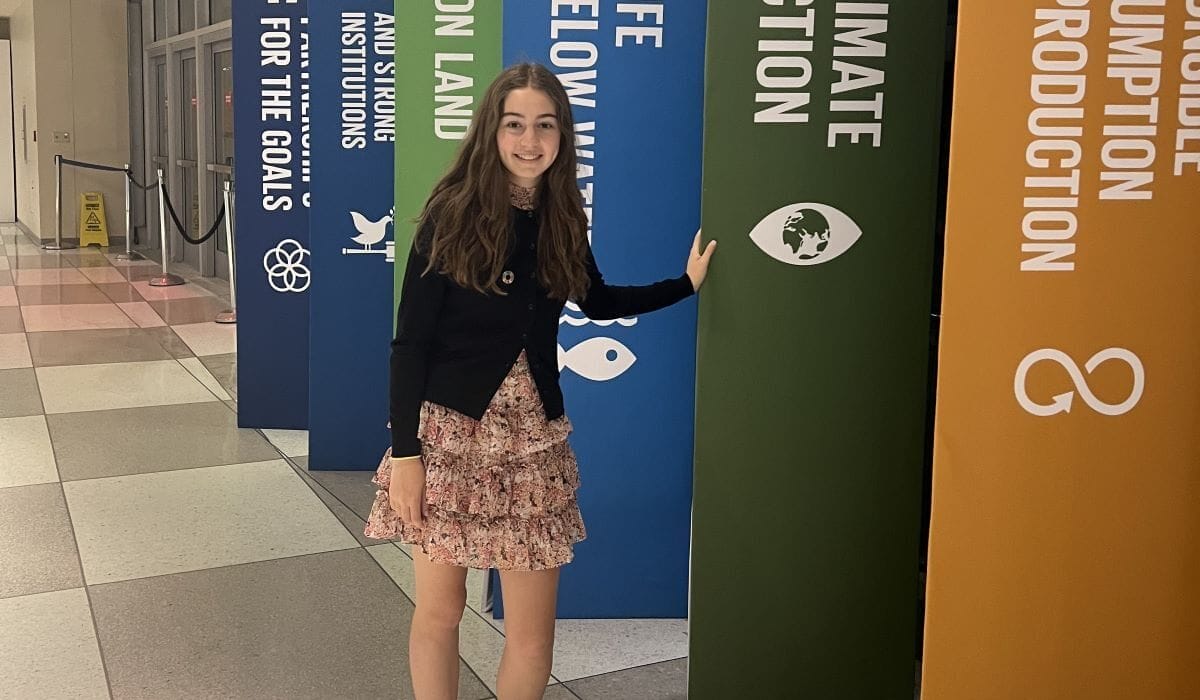Advancing Sustainability: Composting, Reuse and Climate Advocacy

Meet Daily Point of Light Award honoree Caitlin Riordan. Read her story, and nominate an outstanding volunteer or family as a Daily Point of Light.
Caitlin Riordan is 17 years old. She is passionate about coding, engineering and data science. She sees today’s climate crisis as an urgent global challenge.
Recently, she’s been involved with “Green Champions,” which allows educators to collaborate alongside the technical education department and city sustainability directors to create paid work-study opportunities for students. These positions are designed for students in Caitlin’s high school’s special education program, which focuses on facilitating sustainable systems. She remains excited to develop training and resources that teach valuable life and career skills, including managing compost systems and overseeing waste management to her peers.
While volunteering with “Green Champions” Caitlin has implemented compost systems, recycling programs, reusable lunch ware and allocated faculty for “Green Champions” roles across 13 schools over the past four years. In addition, Caitlin has collaborated with over 20 restaurants. It has allowed her to introduce more than 60 new vegan meal options. Her diligent work as a climate advocate has given her the opportunity to contribute to a Climate Justice Education bill and organize a state-wide rally in support of climate justice legislation.
What inspires you to volunteer?
Since childhood, I’ve had a deep love for gardening and a strong connection to nature. When I started high school, I was surprised and disappointed to discover that my school did not have a composting system. I immediately saw the opportunity to make a difference, so I assembled a small team and spearheaded a waste audit. We sorted through hundreds of pounds of food waste, recyclables and trash, and our efforts revealed that approximately 655 pounds of the waste disposed of each week in the cafeteria could have been composted.
This discovery was eye-opening. The volume of food waste and single-use lunch containers being discarded was shocking. Immediately it became clear to me that implementing more sustainable systems at the school could have a significant and positive impact on both the environment and the student community.

Tell us about your volunteer role with Green Champions.
I’m part of a team at my high school that collaborates with other schools in our district to advance environmental initiatives. This journey began with a small group of friends. We formed the Newton Climate Coalition, a network of student groups across high schools in our district. We started with a vision to connect and empower students within our community, and our coalition quickly grew to include seven student groups.
Additionally, I’ve been involved in climate justice legislation through Our Climate. I currently serve as the outreach coordinator for the National Youth Council at Project Green Schools. In this role, I have the privilege of mentoring and supporting young students nationwide who are eager to lead similar initiatives in their own communities, which has been incredibly fulfilling and inspiring.
What inspired you to get started with this initiative?
One thing that continually inspires me is working with children. I’ve met many kids at farmers’ markets, and their enthusiasm is contagious. It’s incredibly rewarding to see kids so enthusiastic about sustainability. It’s also exciting to think that by developing these habits early on, they can have a lifelong impact.
What are your long-term plans or goals for the organization?
I hope to reach more communities and inspire even more youth to join the cause. I’m excited to continue my work with Take Action Global, Our Climate and Project Green Schools. I’m also looking forward to strengthening partnerships with universities and advancing research in this field.
What’s been the most rewarding part of your work?
The support from teachers and faculty in my community has been meaningful. Recently, there was a 16-month period where teachers lacked contracts, where they struggled to balance other commitments and union guidelines. This limited their ability to engage in projects outside of school and it eventually led to a two-week strike. Their support, even under such constraints, was inspiring.
What have you learned through your experiences as a volunteer?
There is power in determination and consistency when making a big impact through small actions. When I launched the compost system, we began with a small-scale pilot. Every Friday, we would visit 11 teachers’ departments lunchrooms, collect their compost and bring it to the loading dock. This small-scale effort gained support from the entire community, encouraged many students to get involved and paved the way for larger initiatives.
Tell us about future partnerships, programs or events that you are excited about.
Next year, in May, we will be celebrating sustainable initiatives where local and statewide organizations will have the opportunity to present their work. In the meantime, I am working with a youth-led nonprofit organization Restoring Rainbows, where I am designing a centrifuge. I will restore markers and develop an app that will showcase art created with the restored supplies.

Why is it important for others to get involved with causes they care about?
It is important to get involved in causes that matter to you. For me, I enjoy being a part of something that makes a difference. It helps to deepen my understanding of the world, introducing you to new perspectives.
Any advice for people who want to start volunteering?
Find a community with shared interests. It will expose you to diverse perspectives and provide you with a support network. It’s refreshing to know that you don’t have to tackle big issues alone when you have like-minded people by your side.
What do you want people to learn from your story?
The key to making a difference in the climate crisis is to carefully consider your options. It is important to learn from and with others and take consistent steps toward progress. Even small, individual actions can contribute to large-scale change over time.
Do you want to make a difference in your community like Caitlin? Find local volunteer opportunities.
